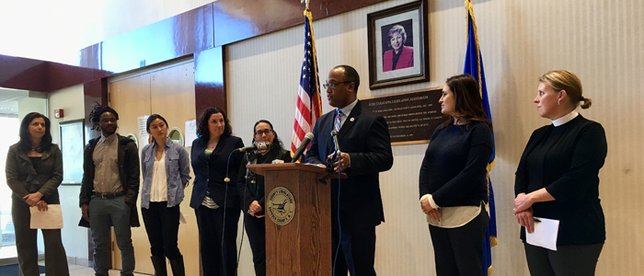Hauppauge, NY – March 30, 2017 – Suffolk County Legislature Presiding Officer DuWayne Gregory yesterday joined former teenage offenders, as well as local civil rights and children’s advocates, to call on the New York State Senate to pass legislation raising the age of criminal responsibility for 16- and 17-year-old youth in New York State.
New York and North Carolina are the only states in the country that still prosecute 16- and 17-year-olds as adults. The law would raise the age of criminal responsibility to 18, except for certain serious crimes such as murder and some violent felonies, and create a youth court for juvenile offenders. Legislation to raise the age of criminal responsibility to 18 has been approved by the New York State Assembly but has been sitting in committee in the New York State Senate for several years now. Governor Andrew Cuomo has signaled his support for raising the age to 18 as a part of this year’s budget.
“It is our responsibility to ensure that young adults are not incarcerated as adults, as we know it compounds the issues that landed them in jail in the first place. Subjecting them to abuse, rather than educating them and providing them with the foundation they need to lead constructive lives, is a mistake that has been well documented time after time. This law needs to be changed now,” said Presiding Officer Gregory.
Statistics illustrate that young adults in adult prisons are twice as likely to report being beaten by staff and 50 percent more likely to be attacked with a weapon, as well as 36 times more likely to commit suicide in an adult facility than in a juvenile facility.
“The need for this legislation has never been greater,” said Dr. Jenny Bencardino, founder and director of Free Spirit, which was established in 2015 to help organize tennis and soccer instruction for children at the Juvenile Detention Centers in Long Island. “Properly rehabilitating our children begins with giving them a sense of worth to turn their lives around. Throwing them in adult prisons does not serve anyone’s future.”
Studies have found that young people transferred to the adult criminal justice system are 34 percent more likely to be re-arrested for violent and other crimes than youth retained in the youth justice system.
“We need to assure our young men and women are afforded an opportunity to get ‘back on track’ in a system which offers them help and support and not in a system where they are more likely to reoffend and least likely to lead a productive life in society,” said 9th District Suffolk County Legislator Monica Martinez.
“Even though more than 75 percent of youth arrested between the ages of 16 and 17 are arrested for misdemeanors, under state law they must be tried as adults and, if convicted, sent to adult institutions to serve their sentence. Young people, as much as anyone, must be held accountable for their actions. However, in holding them accountable, it is in our best interest to invest and choose an accountability system that allows them to choose a different path,” added Suffolk County Executive Steve Bellone.
Other leaders looking for productive ways to rehabilitate our youth include Serena Liguori, executive director of Herstory Writers Workshop. She said, “We have long supported treating 16- and 17-year-old non-violent offenders in age-appropriate ways. We provide writing workshops to youth in Nassau, Suffolk and Rikers jails and have heard many of our young writers share the traumatic impact of adult jails on their young lives. New York continues to fail young people who are often substance abusers, not violent offenders, by incarcerating them with adults where they are more likely to be victimized and less likely to get the supportive rehabilitative resources they deserve.”
Scientific research has established that the human brain is not fully formed until the age of 25. Adolescents’ behavior is often impulsive and teenagers lack the ability to focus on the consequences of their actions.
According to the Scientist Action and Advocacy Network (ScAAN), a group that compiled evidence from 25 neuroscience and psychology studies on adolescent development, the adolescent brain is remarkably different from the adult brain. “The brain is still under development through the teenage years,” said Jenn Laura Lee of ScAAN. “This means that adolescents are very sensitive to the traumatic experience of being incarcerated alongside adults. But it also means that adolescents should be particularly amenable to rehabilitation through age-appropriate programs.”
Reverend Kate Jones Calone, minister in the Presbyterian Church USA, added, “The Legislature is close to finally bringing New York in line with the 48 other states who charge youth as youth, rather than adults. Senator Flanagan should ensure that this smart-on-crime and morally urgent legislation to make our communities safer is in the State’s final budget.”










